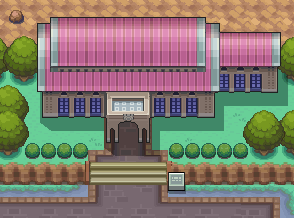From Bulbapedia, the community-driven Pokémon encyclopedia.
|
|
| Line 26: |
Line 26: |
| [[File:141 f.png|thumb|left|The Kabutops Fossil]] | | [[File:141 f.png|thumb|left|The Kabutops Fossil]] |
| [[File:142 f.png|thumb|The Aerodactyl Fossil]] | | [[File:142 f.png|thumb|The Aerodactyl Fossil]] |
| The Pewter Museum of Science hosts a wide array of different exhibits and attractions. The first floor contains Fossil exhibits, including [[Fossil]]s of {{p|Aerodactyl}} and {{p|Kabutops}}, the rare, prehistoric Pokémon. The second floor has a space exhibit featuring a model of a {{wp|Space Shuttle}}, and a rock, most likely a [[Moon Stone]], that fell onto [[Mt. Moon]] in the form of a meteorite. In Generation VII, the Aerodactyl fossil is replaced with a cast model, and the space shuttle is replaced with a large fossil, with additional fossil displays being near the right-most wall. | | The Pewter Museum of Science hosts a wide array of different exhibits and attractions. The first floor contains Fossil exhibits, including [[Fossil]]s of {{p|Aerodactyl}} and {{p|Kabutops}}, the rare, prehistoric Pokémon. The second floor has a space exhibit featuring a model of a {{wp|Space Shuttle}}, and a rock, most likely a [[Moon Stone]], that fell onto [[Mt. Moon]] in the form of a meteorite. In Generation VII, the Aerodactyl fossil is replaced with a cast model. |
|
| |
|
| In the Generation I games and their Generation III remakes, an old man on the second floor of the museum states: "''July 20, 1969! Humankind first set foot on the moon that day. I bought a color TV just so I could watch that news.''" July 20, 1969 was indeed the date that humans first landed on Earth's Moon in the [[Pokémon world in relation to the real world|real world]]. In Generation VII, he also talks about humankind's plans to set foot on {{wp|Mars}}. | | In the Generation I games and their Generation III remakes, an old man on the second floor of the museum states: "''July 20, 1969! Humankind first set foot on the moon that day. I bought a color TV just so I could watch that news.''" July 20, 1969 was indeed the date that humans first landed on Earth's Moon in the [[Pokémon world in relation to the real world|real world]]. In Generation VII, he also talks about humankind's plans to set foot on {{wp|Mars}}. |
Revision as of 14:03, 2 December 2018
The Pewter Museum of Science (Japanese: ニビ科学博物館 Nibi Museum of Science) is located in the north side of Pewter City, Kanto, and is one of the city's main attractions. The Pewter Museum of Science hosts a wide range of attractions and exhibits, largely based around space and Fossil exploration. The museum holds a huge collection of artifacts, including rocks from the moon, space shuttles, and Fossils of ancient Pokémon. The admission is $50 for a child's ticket.
In the games
Floors
There are two floors to explore in the Pewter Museum of Science. The first floor holds the front desk, and a Fossil exhibit containing the Fossils of Aerodactyl and Kabutops. MissingNo. may use these sprites, depending on its index number. The second floor hosts a space exhibit, featuring a Space Shuttle and Moon Stone that fell onto Mt. Moon. The player is able to explore the museum at any time, after paying the $50 admission fee.
Once the ability to use Cut out of battle has been gainedRBYFRLG or the Secret Technique Chop Down has been learnedPE, the player can sneak into the back of the museum and acquire the Old Amber from a scientist there, allowing the player to revive an Aerodactyl later in the game. In FireRed and LeafGreen, there is also a Move Tutor who will teach Seismic Toss.
In Generation II, the museum is closed due to renovations.
In Generation IV, the museum is open for business, but the major exhibitions are elsewhere, so entry is free. There is only one floor in this generation. There is a scientist in the museum who will revive a player's Fossils, much like the scientist at the Cinnabar Lab in Generations I, III, and VII. This is due to the fact that Fossils can be found under rocks using Rock Smash, unlike in Generation II, where players were required to transfer Fossil Pokémon from the Generation I games using the Time Capsule. Steven Stone, former Champion of the Hoenn region, will also appear here after the player has received a Hoenn starter Pokémon from him at the Silph Co., inspecting a meteorite exhibit.
Exhibits
The Pewter Museum of Science hosts a wide array of different exhibits and attractions. The first floor contains Fossil exhibits, including Fossils of Aerodactyl and Kabutops, the rare, prehistoric Pokémon. The second floor has a space exhibit featuring a model of a Space Shuttle, and a rock, most likely a Moon Stone, that fell onto Mt. Moon in the form of a meteorite. In Generation VII, the Aerodactyl fossil is replaced with a cast model.
In the Generation I games and their Generation III remakes, an old man on the second floor of the museum states: "July 20, 1969! Humankind first set foot on the moon that day. I bought a color TV just so I could watch that news." July 20, 1969 was indeed the date that humans first landed on Earth's Moon in the real world. In Generation VII, he also talks about humankind's plans to set foot on Mars.
Enigma Stone event
In HeartGold and SoulSilver, if the event item, Enigma Stone, is taken to the Pewter Museum of Science, traveling Pokémon Champion Steven Stone will have a researcher from the museum examine the stone. The researcher then discovers that it is really the Soul Dew, an item said to be the crystallized souls of Latias and Latios. After this brief encounter, depending on the game version, one of the twin dragons will appear outside of the Museum, giving the player an opportunity to capture it. If the player does not engage in a battle with the Latios or Latias, it will remain there until the player has done so.
Items
Pokémon
Generation IV
| Pokémon
|
Games
|
Location
|
Levels
|
Rate
|
| Gift Pokémon
|
|
|
HG
|
SS
|
|
20
|
Fossil
|
|
|
HG
|
SS
|
|
20
|
Fossil
|
|
|
HG
|
SS
|
|
20
|
Fossil
|
|
|
HG
|
SS
|
|
20
|
Fossil
|
|
|
HG
|
SS
|
|
20
|
Fossil
|
|
|
HG
|
SS
|
|
20
|
Fossil
|
|
|
HG
|
SS
|
|
20
|
Fossil
|
| A colored background means that the Pokémon can be found in this location in the specified game. A white background with a colored letter means that the Pokémon cannot be found here.
|
Layout
Inside design
Outside design
In the anime
In the main series
In the anime, Seymour is a researcher from the museum; however, this isn't mentioned in the dub.
In Pokémon Origins
Red was seen visiting the Pewter Museum of Science in File 1: Red, where he overheard two girls talking about the local Gym Leader, Brock.
In the manga

Pewter Museum of Science in Pokémon Adventures
In the Pokémon Adventures manga
In Make Way For Magmar!, the museum was burned down by two wild Magmar. While traveling with Giovanni, Red came across the burning museum, and used his Sandshrew's Sand Attack to freeze them in place. Giovanni later killed the Magmar with his Cloyster when they regained consciousness.
The museum was later rebuilt, and during the invasion of the armies of the Elite Four in the Yellow arc, Brock had one of his Geodude protect a Kabuto kept there. After the ordeal, Brock took Kabuto under his ownership and later evolved it into a Kabutops.
Trivia
- In the Generation I games, the plaque accompanying the space shuttle model reads "Space Shuttle Columbia"; however, in the remakes, the plaque simply reads "Space Shuttle". This is probably due to the fact that on February 1, 2003, the real Space Shuttle Columbia disintegrated upon re-entry during its 28th mission, killing all seven crew members. The reference to Space Shuttle Columbia was kept in the Japanese version of the Generation III games, but was removed in Generation VII.
- The Kabutops and Aerodactyl Fossil sprites are in the same pose as their species sprite in Pokémon Red and Green and Pokémon Red and Blue. This, however, is not true for Pokémon Yellow, or Pokémon FireRed and LeafGreen. Yellow used the Fossil sprites from Red and Blue which did not match the species' poses in Yellow, while LeafGreen and FireRed Fossil sprites had the same poses as the species did in Pokémon Ruby, Sapphire, and Emerald.
- In Pokémon: Let's Go, Pikachu! and Let's Go, Eevee!, if the player brings a Pokémon with an evolutionary family member that evolves by Moon Stone near the Moon Stone on 2F, it will stop following the player and stare at it. Similarly, if the player brings a Kabutops near the Kabutops fossil, it will stop walking and stare at the fossil.
In other languages
| Language
|
Title
|
| Chinese
|
Cantonese
|
深灰科學博物館 Sāmfūi Fōhohk Bokmahtgún *
科學博物館 Fōhohk Bokmahtgún *
|
| Mandarin
|
深灰科學博物館 / 深灰科学博物馆 Shēnhuī Kēxué Bówùguǎn *
尼比市科學博物館 / 尼比市科学博物馆 Níbǐ Shì Kēxué Bówùguǎn *
科學博物館 / 科学博物馆 Kēxué Bówùguǎn *
深灰市科学博物馆 Shēnhuī Shì Kēxué Bówùguǎn *
|
 Finnish Finnish
|
Tiedemuseo
|
 French French
|
Musée des Sciences d'Argenta
|
 German German
|
Marmorias Museum der Wissenschaft
|
 Italian Italian
|
Museo della Scienza di Plumbeopoli
|
 Korean Korean
|
회색시티 과학 박물관 Hoesaek City Gwahak Bakmulgwan
|
 Brazilian Portuguese Brazilian Portuguese
|
Museu de Ciências de Pewter
|
 Russian Russian
|
Музей науки Пьютер-Сити Muzey nauki P'yuter-Siti
|
 Spanish Spanish
|
Museo de la Ciencia de Ciudad Plateada
|
 Vietnamese Vietnamese
|
Viện bảo tàng Khoa học Nibi
|
|
|
|













